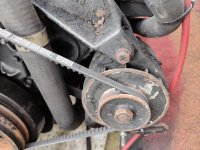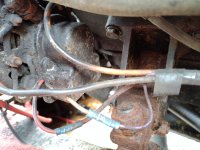ColonelNivlag
Cadet
- Joined
- May 24, 2022
- Messages
- 9
Hi all,
Thanks for those who helped on my previous question! So far I'm oil leak free!
I've been trying to research this one before asking here but can't seem to find anyone with a similar issue.
I've attached pics of the alternator, so you can help point me at the replacement which I think you're going to tell me I need! There's no part numbers on it. So don't want to order the wrong thing! Please ignore the state of the connections / rubber everywhere. I'm working on cleaning things up! I've not had the boat long!
Thanks for those who helped on my previous question! So far I'm oil leak free!
I've been trying to research this one before asking here but can't seem to find anyone with a similar issue.
- When Idling I do not get a detectable voltage beyond base at the battery terminals.
- If I rev the engine +2000 RPM I still get nothing beyond base at the battery terminals
- When under load, towing etc, my battery monitor does register a charging voltage. A max of 13.40V.
- When I checked the alternator directly with a meter on the orange output wire, at idle and at +1500 RPM I could detect 13.7V at both
I've attached pics of the alternator, so you can help point me at the replacement which I think you're going to tell me I need! There's no part numbers on it. So don't want to order the wrong thing! Please ignore the state of the connections / rubber everywhere. I'm working on cleaning things up! I've not had the boat long!





















